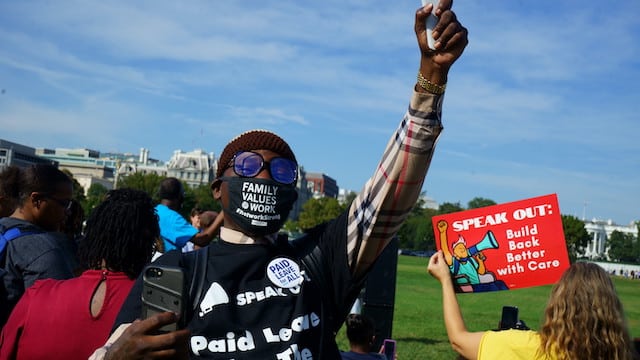Raleigh is Ground Zero for Families

In honor of the 21st anniversary of the Family and Medical Leave Act, we’ve asked activists around the country to reflect on what FMLA means in their states, how states are taking action to improve upon this seminal law and where we still need to do work. Visit the FMLA 21st Birthday Blog Carnival for blogs from around the country.
By Carol Joyner
The Mass Moral March on Raleigh scheduled for February 8 matters to families. Recent repressive policies in North Carolina not only cut at the fabric of families, undermining their economic security and jeopardizing their health, but also seek to disempower voters who fight on behalf of family-friendly public policies.
An impressively broad coalition representing thousands will lead the February 8 rally and demonstration in the style of Moral Monday protests that have captivated North Carolina in recent months. Groups like the North Carolina NAACP, Beloved Community, Planned Parenthood, the North Carolina Justice Center, faith leaders and a host of others are protesting against sweeping laws that the NC State Legislature has passed: restricting access to reproductive and infant health; cutting public school budgets and social programs; repealing the Racial Justice Act and instituting a regressive tax system. Worst among this wave are new voter suppression laws, which aim to ensure that NC voters have less access to the ballot box and no formal mechanism to fight back.
Voter suppression laws that went into effect immediately after the Supreme Court gutted the Voting Rights Act of 1965 affect the same voters who consistently support progressive issues: African American, young adults, elderly and disabled citizens and unmarried women. It’s not complicated. When these voters cannot cast their ballot, the candidates who support equality, fairness and families cannot win.
Take paid sick days and paid family leave. There’s ample data on American attitudes towards these policies. According to a recent, Huffington Post poll, 61 percent of Americans support a system of paid maternity leave, 85 percent support paid sick days and a majority support paid paternity leave. And it’s not just Democrats and young voters who support such policies, but Republicans and Independents alike.
There is growing momentum behind campaigns for paid sick days and family and medical leave across the country. Just last week, Newark became the seventh city to pass paid sick days, following victories in Washington, D.C.; Jersey City, NJ; Seattle; and Portland, Oregon. In New York City, Mayor de Blasio announced plans to expand the city’s law, providing an additional 300,000 New Yorkers with access to paid sick days. Similarly, family leave insurance laws, which enable people to take time off to welcome a new baby, or care for themselves or a sick family member, have been signed into law in California, New Jersey and Rhode Island.
Millions of Americans now have access to paid sick days and family leave. Why? It’s due, in large part, to increasing numbers of campaigns by national and local organizations that organize workers, business owners and public health officials. Moreover, there is a growing number of public officials who help champion these policies, rally their colleagues and pass 21st century laws that working families need to be responsible family members and effective employees.
That’s why the streak of anti-worker, anti-family policies in places like North Carolina is so shocking.
Support for family-friendly policies is less about party and more about values. In New York City, Bill de Blasio came from single digits to beat the front runner Christine Quinn with a message about paid sick days for all, universal pre-K and a fair tax system. Governor Malloy ran on the issue and won, making Connecticut the first state with paid sick days. The voting public that supports these candidates do so because of their family values.
There’s no mistake. As we fight for family rights from cities across the country to Capitol Hill, voters tell the work and family story at the ballot box. They vote “yes” on paid sick days ballot initiatives; they support candidates who talk about economic security for families; and they oppose politicians who restrict voting rights and thwart efforts to raise the minimum wage.
As Beth Messersmith, North Carolina director of MomsRising put it: “The Moral March and the movement behind it are creating hope and momentum for a new, better North Carolina. NC families understand the connections between their own everyday struggles and the policy decisions being made in Raleigh. From workplace policies to education to healthcare, all of us are affected. North Carolinians are now seeing why it matters to be engaged as voters and to hold our elected officials accountable – and that’s power.”
Thousands will rally in Raleigh on February 8 to continue building that power. North Carolina is ground zero for the fight for families. Join if you possibly can.